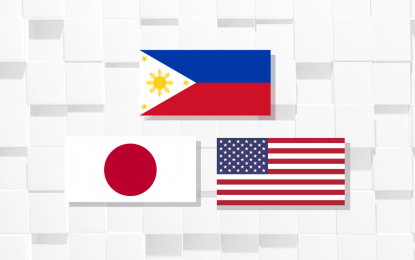
MANILA – The Philippines, the United States and Japan announced Friday (Manila time) their partnership for the development of the Luzon Economic Corridor that will help accelerate investments in critical sectors.
The partnership was unveiled during the historic trilateral summit of President Ferdinand R. Marcos Jr. with US President Joe Biden and Japanese Prime Minister Fumio Kishida at the White House in Washington DC.
The planned development of the Luzon Economic Corridor is the latest economic corridor of the Partnership for Global Infrastructure and Investment (PGII) founded by the G7 countries, and the first in the Indo-Pacific region.
“Our three nations are proud to partner on the first Partnership for Global Infrastructure and Investment corridor in the Indo-Pacific,” said the joint statement issued by Marcos, Biden and Kishida.
“Today, we are launching the Luzon Economic Corridor, which will support connectivity between Subic Bay, Clark, Manila, and Batangas in the Philippines,” it added.
The three countries expressed their commitment to accelerate coordinated investments in high-impact infrastructure projects such as rail; ports modernization; clean energy and semiconductor supply chains and deployments; agribusiness; and civilian port upgrades at Subic Bay.
They also sought to work with multilateral organizations and the private sector to attract “quality (and) transformative” investments.
To promote investment in the Luzon Economic Corridor development, a trilateral event would be held on the sidelines of the Indo-Pacific Business Forum in Manila in May this year.
“The Luzon Corridor is a demonstration of our enhanced economic cooperation, focused on delivering tangible investments across multiple sectors. Japan, the Philippines, and the United States are also partnering to expand cooperation and investments in other areas of the Philippines,” the joint statement read.
The US International Development Finance Corp. also expressed its intent to open a regional office in the Philippines to facilitate further investments across the Philippines.
Japan, on the other hand, has long been supporting connectivity in the area, including rails and roads, through the Japan International Cooperation Agency.
Dealing with ‘economic coercion’
Marcos, Biden and Kishida also vowed to facilitate the steady implementation of ongoing and future economic cooperation projects to help the Philippines attain its goal of becoming an “upper middle-income country.”
They also stressed the need for close coordination in dealing with “economic coercion,” in an effort to promote “enduring, inclusive economic growth and resilience in (their) countries and the broader Indo-Pacific.”
“We are pursuing economic projects that advance our shared objectives: promoting broad-based and sustainable economic growth, and investing in resilient, reliable, and diversified supply chains,” the three leaders said.
“We support the continued progress of the Indo-Pacific Economic Framework for Prosperity (IPEF) to advance resilience, sustainability, inclusiveness, economic growth, fairness, and competitiveness for our economies and the broader region,” they added.
Technology development
The three leaders also bared their plan to seize cutting-edge technological opportunities, as they looked forward to holding the first trilateral Cyber and Digital Dialogue this year to explore additional cooperation opportunities.
The United States, subject to Congressional notification, and Japan, with support from Japanese industry, expressed their intent to provide at least USD8 million for Open Radio Access Network (RAN) field trials and the Asia Open RAN Academy based in Manila.
The plan aims to enable future commercial deployment and an open, interoperable, secure, reliable, and trusted information communications technology ecosystem in the Philippines.
“This builds on prior US and Japanese investment of over USD9 million for these projects in the Philippines. The government of Japan is also seriously considering further investments for the potential commercial deployment of Open RAN technology in the Philippines, including from the Global South Future-Oriented Co-Creation Project,” according to the joint statement.
“The United States and Japan welcome the Philippines’ plan to pilot Open RAN in its national broadband program and free Wi-Fi project. The United States and Japan commend the Philippines’ commitment to develop a national Open RAN policy framework, reaffirming the Philippines’ endorsement of open, interoperable, and trusted architectures,” it added.
Based on the joint statement, there was also a plan to pursue a new semiconductor workforce development initiative, which seeks to give Filipino students a “world-class training” at leading American and Japanese universities to help secure the three nations’ semiconductor supply chains.
The initiative complements the expansion of semiconductor investments in the Philippines that would strengthen supply chain resiliency among the three nations. (PNA)
